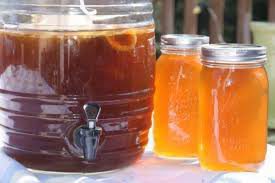Kombucha Yes or No
Kombucha, yes or no? This friends, is a subject of increasing debate. In many cultures Kombucha is known as the “Immortal Health Elixir” Those who drink the proverbial kool-aid believe that kombucha is a precious drink filled with incredible health benefits.
A little History
The exact origination of kombucha, how or where, is unknown. The drink was consumed in east Russia at least as early as 1900, and from there entered Europe. In 1913, kombucha was first mentioned in German literature. At least as early as the mid-1990s it became popular in the US.
What is it?
Let’s begin with the basics. Kombucha is a fermented beverage of black tea and sugar (from various sources including cane sugar, fruit or honey) that’s used as a functional food. It contains a colony of bacteria and yeast that are responsible for initiating the fermentation process once combined with sugar. After being fermented, kombucha becomes carbonated and contains vinegar, b-vitamins, enzymes, probiotics and a high concentration of acid (acetic, gluconic and lactic), which some health experts believe are tied with the following effects:
- Improved Digestion
- Weight Loss
- Increased Energy
- Cleansing and Detoxification
- Immune Support
- Reduced Joint Pain
- Cancer Prevention
The sugar-tea solution is fermented by bacteria and yeast commonly known as a “SCOBY” (symbiotic colony of bacteria and yeast). Although it’s usually made with black tea, kombucha can also be made with green tea too.
More good news: Beneficial Probiotics in Kombucha
An article published in the journal Food Microbiology established that the following probiotics make up this health elixir:
- Gluconacetobacter (>85 percent in most samples)
- Acetobacter (<2 percent)
- Lactobacillus (up to 30 percent in some samples)
- Zygosaccharomyces (>95 percent)
Ultimately, this cocktail of good bacteria interacts together in a unique way to produce some unbelievable health benefits for those who drink it.
Adverse Effects: Yep there some serious potential downsides. I find this accurate in all areas of life-Anything in excess is not good for you. Read more here.
Potential contamination -With all the best intentions I would guess, some folks have missed a beat when doing making their own home brewed kombucha at home, meaning they contaminated their home brew by not properly sterilizing or over fermenting , thereby poisoning themselves when they drank it. Golden rule- Even with Kombucha, it is smells off, toss it out. Its not worth the risk.
If your love for Sugar is akin to a crack habit, kombucha may not be the drink for you. If you know you need at least a 6 step program for your Sugar habit, it would behoove you to skip the kombucha! As mentioned before, anything is excess is not good for you. Kombucha would only add to the candida that could already be having a hell of a dance party in your belly.
Health risks
Due to its microbial sourcing and possible non-sterile packaging, kombucha is not recommended in people with poor immune function, in women who are pregnant or nursing, or in children under 4 years old.
The Bottom Line
After a lot of research and my own experience, the best I can say about kombucha is that it probably won’t kill you and it may work well for you. Personally, I haven’t had any issues with it and it is one of my remedies if I am having consistent digestion issues, or if I’ve been on the rare antibiotic. I will say that apple cider vinegar along with a good probiotic work even better for me. There are no medically documented health benefits, from what I could confirm that prove kombucha to be savior it is sometimes made out to be. Therefore, unless you really like the taste, there’s no clear reason to consume it. If it works for you, you are in good health and have no red health flags then this may be great for you. It bears repeating that health decisions should be based on an evaluation of the risks and benefits. In the case of kombucha, the benefits, other than the subjective, are unsubstantiated. The risks are real, but also it appears very rare.
As for me, I’ll stick with my own favorite fermentations: wheat beer, sauerkraut, yogurt, chocolate (oh yes it is fermented) and cheese. This along with an occasional bottle of a high quality kombucha and I’ll pass on the homebrewed for sure.
Reports of adverse effects related to kombucha consumption are rare. It is unclear whether this is because adverse effects are rare, or just underreported. The American Cancer Society says that “Serious side effects and occasional deaths have been associated with drinking Kombucha tea
My faves
Resources You Might Enjoy
COOKED by Michael Pollan – A great read that I reference frequently
Prefer to watch? You can view COOKED here
Microbial Foods.org on The effects of red pepper seasoning on Kimchi
Microbial Foods.org on Diversity of Kombucha
I hope you will take a few moments to dive deeper into the practice of eating fermented foods for good health.
to your health, 
DISCLAIMER–As a food and fitness blogger, I often receive free samples to review but I am never paid for my opinions. The views expressed here are based solely on personal experience with the products and my interactions with the company’s staff. Your experiences and sentiments may differ from my own



